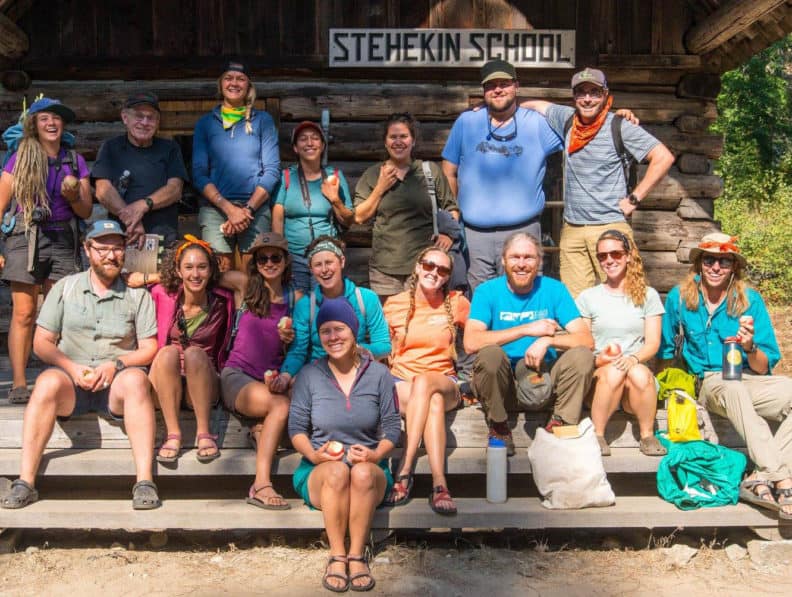
Welcome New Graduate Students!
We are a new generation of environmental leaders. We are the 17th graduate cohort at the North Cascades Institute, ready to immerse ourselves in learning and work within the greater community. One of my new tasks, as a fully-integrated community member, is to produce blog posts for your enjoyment.
So, hey! I’m Montana, and below is Part 1 in a 3-part series of graduate student introductions. Keep in mind that we recently finished the Place-based Learning Field Course, and are knee-deep into our fall Natural History coursework. Below are the reasons why we’re here, and what we want to take away from our year-long residency. We’ve also included some of our most memorable experiences so far. Much more to come, my friends.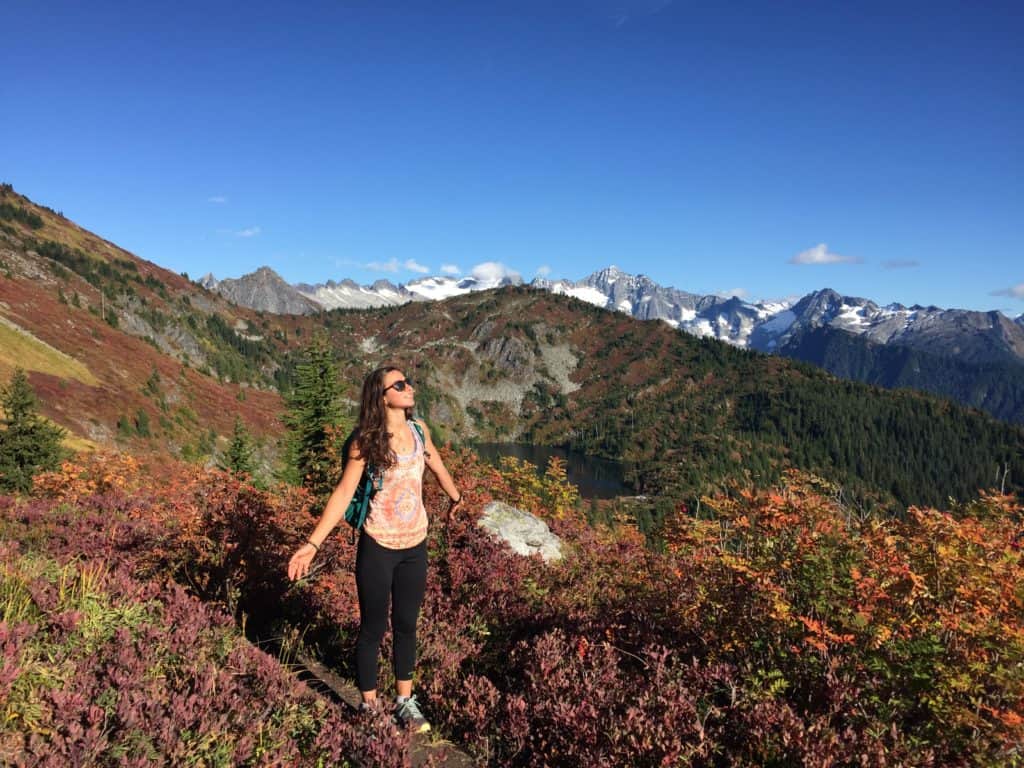
Yours truly day-hiking to Monogram lake during prime fall color
Montana Napier:
As a teenager, I participated in a program called Girls on Ice. For eight days I camped on a rocky moraine on Mount Baker, and was challenged outside of my comfort zone through a wilderness science expedition. At the end of the program, we stayed at the cozy Environmental Learning Center and presented our research on the Easton glacier. I’d never seen a community quite like the North Cascades Institute before, or people as knowledgeable as the Naturalists. They seemed to know everything about the natural world! I was inspired to return.
After college, I fell in love with resource interpretation and environmental education through my work with national and state parks. This master’s program aligned well with my career goals, and I appreciated the emphasis on experiential learning. I hope to continue developing my own relationship to this place, and to facilitate deep connections between others and this place, too.
My most memorable experience so far involves snorkeling through salmon habitat in the Methow Valley. I had never worn a wetsuit, let alone snorkeled before. Seeing a stream from within the blue-green water expanded my worldview. For the first time I surveyed an environment with the eyes of a salmon and watched creatures swim by with endless curiosity. It was worth taking a dip in shallow, 50F water!
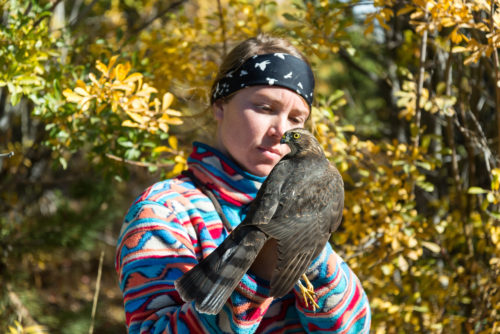
Darcy holding a sharp-shinned hawk on Chelan Ridge; photo by Brendan McGarry
Darcy Page:
I felt pulled to join the NCI grad program because it is exceptionally experiential. One of my favorite experiences so far was our time with Hawk Watch International. Their mission is to conserve our environment through education, long-term monitoring, and scientific research on raptors as indicators of ecosystem health.
I had the rare privilege of releasing a Sharp-shinned hawk back into the air with my own two hands. Afterwards I felt unusually euphoric, elated and somehow grounded. Looking into her wide, alert eyes I noticed they were vibrant yellow, a sign that she is juvenile. As I felt her soft plumage and admired the dark brown piping on her feathers I also noticed her crop was full (possibly with a warbler). She looked healthy and strong based on her feathers and I released her into the air with a blessing, for her journey and my own.
The joy of teaching, for me, is to inspire students in the natural world through hands on discovery. My short term goals from this program are to become a more informed liaison for youth to reconnect with their natural needs and natural environment. This is why I believe that sustained time in the wild is one of the most important and stabilizing experiences for a young person and it’s a pleasure to work for this cause.
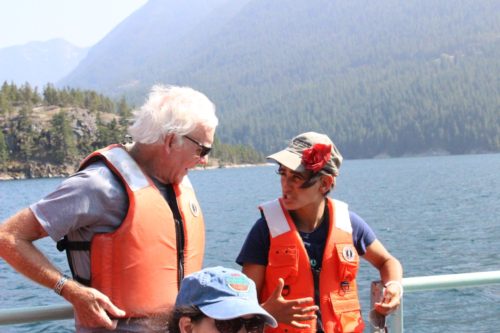
Gina chatting with Gerry Cook about life in the North Cascades
Gina Roberti:
One of the most exciting aspects about the Graduate M.Ed Residency at the North Cascades Environmental Learning Center is the opportunity it provides for me to connect with local policy makers, activists, and scientists through our place-based learning curriculum.
The picture above is from one of our first excursions in North Cascades National Park. We toured Ross Lake on the Mule with the renowned (but now-retired) maintenance staff, Gerry Cook. This opportunity to connect with local knowledge and expertise in the field has enriched my experience as a student. It has allowed me to see ways in which my educational training can serve our community.
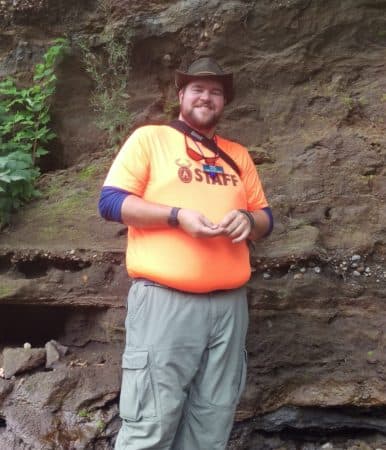
Eric enjoying life during a geology field trip
Eric Buher:
After 10 years of classroom teaching, I was interested in a new way of teaching, and a new message. The Graduate M.Ed. program was especially exciting for me because of the inclusion of the Nonprofit Leadership & Administration Certificate. I feel like I’ve already gotten so much from my time at the ELC that anything more is just gravy. I’m looking forward to teaching in the Mountain School program, and the chance to experience a North Cascades winter from the inside.
What’s been one of my most memorable experiences so far? Without a doubt, standing in Skagit Bay after paddling 80 miles downstream from Marblemount was a defining experience in the program this summer. The direct personal experience of the connection along the Watershed from mountain to sea is difficult to quantify in mere words. Everyone should try it!
The chance to personally observe wildlife in this course has been another highlight. From Merlin to Moose, and Spawning Salmon to Black Bear, each encounter has been special. A whole year in this bioregion, living and learning among the Cascades, is the experience of a lifetime. There’s nowhere I’d rather be.
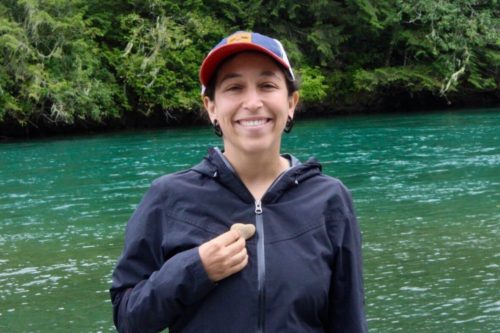
Marissa holding her beloved heart rock at the Blue House in Marblemount
Marissa Bluestein:
I worked in television news since college, and the daily news had started to wear on me. Hearing more stories about heartbreak instead of hope made me feel helpless, and I wanted to be a more active participant in my community. Over the years, I volunteered for organizations like Rape Crisis of New Mexico, Sandia Mountain School, the Museum of Natural History and found educating adults and kids truly inspired me. I scoured the internet for schools that incorporated experiential learning with the outdoors. The North Cascades Institute had everything I was looking for: an immersive learning approach, focus on outdoor, experiential education, community involvement and getting to live in a national park was an added perk.
Many kids don’t have access to outdoor experiences at a young age and my hope is to be able to bring kids to a safe and educational outdoor space. Learning from the natural world should be something everyone has the opportunity to experience and grow from. Promoting a sense of environmental stewardship, conservation and appreciation of the outdoors through education can give kids a chance to get to know the world more completely.
When I arrived at the Environmental Learning center back in August I had no idea I would be in the field for 40 out of 49 days, backpack over Cascade Pass in the snow, see the sunset at Deception Pass or meet such incredibly talented people I now call my friends. From when I arrived that hot and smoky summer day to now, as I sit here on a rainy fall October evening, I can honestly say every moment has left a lasting impression.
This is part one of graduate student introductions. You can find part two here.

